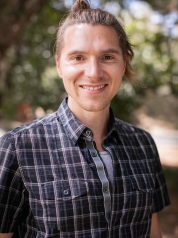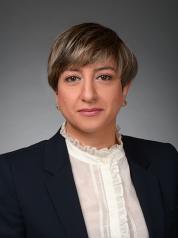Malyi Research Awards 2024
Professor Michael Albertus is a Professor of Political Science at the University of Chicago. His research examines democracy and dictatorship, inequality and redistribution, property rights, and civil conflict. The Malyi Center has awarded Professor Albertus research funding for his project, Consequences of the Legal Recognition of Ethnic Community Institutions: Evidence from Peru.
This project seeks to advance research on the consequences of the legal recognition of Indigenous community institutions. It does so in Peru, where thousands of indigenous communities gained legal recognition against a backdrop of civil war in the 1980s and 1990s. The project will geolocate communities, identify population centers within these communities, assign administrative data on the timing of community recognition and land titling, and match to communities event-level data from Peru’s Truth and Reconciliation Commission to examine how community legal recognition impacted local conflict and contestation during the country’s civil war. The project has important implications for understanding how the process of legal recognition of Indigenous communities and their institutions impacts social inclusion and contestation. It also stands to advance our understanding of conflicts where ethnic identity and legal/institutional recognition claims are at the heart of insurgencies and contested by the state and among communities themselves.
Pegah Banihashemi is a JSD candidate at the University of Chicago Law School, where she also completed an LLM in 2022. Pegah is currently working on the history of the formation of the Iranian Constitution both before and after the Islamic Revolution of 1979. In this project, she explores the problems of implementing the constitution in Iran. Part of Pegah's project is dedicated to the issue of comparing the constitutions of different countries, and she intends to present in her work a suitable format of a constitution for Iran that can be more stable over time.
The Center assisted Pegah with research funds to gain access to materials and resources for her research.
Lingnan He is a PhD candidate in the Department of Political Science. The Malyi Center awarded Lingnan research funding for her project, Nudge through Judges: Judicial Reform as Persuasion.
How do authoritarian leaders credibly alleviate foreign economic actors’ concerns about the local business environment? This project formalizes the idea that policymakers can strategically leverage systematic judicial reforms to persuade outsider investors to act in the regime’s interest. In particular, the foreign actor is concerned about protectionism-induced distortions in the host country. Judicial reforms mobilize judges to make more pro-nonlocal firm decisions. The foreign actor then infers the level of distortions through the ruling outcomes and makes decisions about market entry. In the equilibria, the level of market optimism and the foreign actor’s entry costs across industries jointly impact the effectiveness of judicial reform as a persuasion device. Empirically, combining data from China’s civil lawsuits, tariff changes, and firm locations, the research evaluates how exposure to the trade war shapes policymakers’ incentive to implement judicial reforms and the ruling outcomes. The analysis shows that a raised trade barrier likely drives out productive domestic firms with more overseas connections, which disincentivizes policymakers from pursuing judicial independence.
Professor Jon C. Rogowski is a Professor of Political Science at the University of Chicago. His research interests are in American politics, where he studies representation and accountability, political institutions, and American political history. The Malyi Center awarded Professor Rogowski research funding for his project, The Institutionalization of the American Administrative State.
How well does the state serve its constituents? While U.S. politicians, commentators, and citizens express concerns about declining bureaucratic capacity and the politicization of personnel selection, neither these concerns nor the proposed remedies are unique to our contemporary era. On the contrary, some of the most important institutional changes in U.S. governance concern the organizational capacity of the federal bureaucracy and the role of politics in selecting its personnel. This project documents the evolution of the administrative state between the Civil War and the Cold War and examine its consequences for American governance. It examines the composition of bureaucratic positions before civil service reform, studies the consequences of merit-based protections for the selection of personnel, and identifies how changes in organizational capacity affect bureaucratic outputs. This research provides comprehensive evidence about historical changes in the American state while also addressing theoretical questions relevant to contemporary political debates.
Professor Susan Stokes is the Tiffany and Margaret Blake Distinguished Service Professor in the Department of Political Science. Her research and teaching interests include democratic theory and how democracy functions in developing societies, distributive politics, and comparative political behavior. The Malyi Center awarded Professor Stokes research funding for her project, Countering Mistrust of Democratic Institutions.
Political leaders in many countries worldwide have been elected and then undermined their democracies, a phenomenon known as democratic erosion. These leaders use public statements to reduce public confidence in institutions like election administration bodies. How can confidence be restored? The research team has used survey experiments to understand one example of this process: the Mexican president’s rhetorical attacks on a key Mexican institution, the National Electoral Institute. Our experimental findings indicate that presidential criticisms do undermine democratic confidence. But we also show that rebuttals of the president’s statements can restore this confidence.
Shih-An Wang is a JSD candidate at the University of Chicago Law School. Her current research project aims to analyze how judiciaries in countries with geopolitical tensions facilitate dialogues regarding the conflicts between national security and constitutional freedoms, focusing on the Constitutional Courts of South Korea, Taiwan, and Lithuania. Her research interest is in comparative constitutional law and democracy, executive power and regulations, and East Asian comparative law. In addition to her academic work, Shih-An serves as a Project Commissioner and Director of the North American Taiwan Studies Association.
The center awarded Shih-An with research funds to finance her participation in the Law and Society Association 2024 Annual Conference in Denver, Colorado. While attending the conference, Shih-An presented her research in a talk titled "Judicial Strategies under Geopolitical Distress: The Constitutional Court of Taiwan." She also served as a moderator and discussant on a panel titled, “Constitutionalism Outside of Courts: Foundational Norms and Principles from a Comparative Perspective”.




